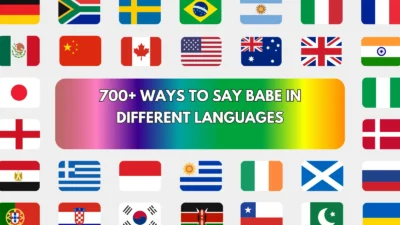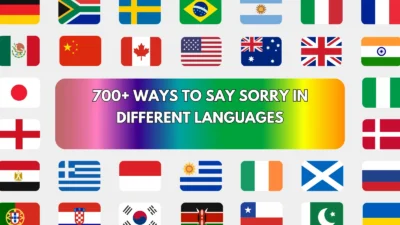The word “please” is a cornerstone of politeness in every language. While its exact form and usage can differ — from formal phrases to casual expressions — the intent remains the same: showing respect and courtesy.
Below, you’ll discover how to say “please” in 70 different languages, with pronunciations and example sentences to help you use them naturally.
How to Say “Please” in 70 Different Languages
- German 🇩🇪 – bitte | BIH-tuh
Können Sie mir bitte helfen? (Can you please help me?) - Spanish 🇪🇸 – por favor | por fah-VOR
Por favor, cierra la puerta. (Please close the door.) - French 🇫🇷 – s’il vous plaît | seel voo PLEH
S’il vous plaît, parlez plus lentement. (Please speak more slowly.) - Italian 🇮🇹 – per favore | per fah-VOH-reh
Per favore, passami il sale. (Please pass me the salt.) - Portuguese 🇵🇹 – por favor | por fah-VOR
Por favor, venha aqui. (Please come here.) - Dutch 🇳🇱 – alstublieft | ahls-too-BLEEFT
Mag ik wat water, alstublieft? (May I have some water, please?) - Russian 🇷🇺 – пожалуйста (pozhaluysta) | pah-ZHAH-loos-tah
Пожалуйста, дайте мне меню. (Please give me the menu.) - Mandarin Chinese 🇨🇳 – 请 (qǐng) | cheeng
请坐。 (Please sit.) - Japanese 🇯🇵 – お願いします (onegai shimasu) | oh-neh-GAI shee-mah-soo
水をお願いします。 (Water, please.) - Korean 🇰🇷 – 제발 (jebal) | cheh-bahl
제발 도와주세요. (Please help me.) - Hindi 🇮🇳 – कृपया (kripya) | krip-yah
कृपया बैठिए। (Please sit.) - Bengali 🇧🇩 – অনুগ্রহ করে (onugroho kore) | oh-noo-gro-hoh koh-reh
অনুগ্রহ করে এখানে আসুন। (Please come here.) - Urdu 🇵🇰 – براہ کرم (barah-e-karam) | ba-rah-e-karam
براہ کرم میرا انتظار کریں۔ (Please wait for me.) - Arabic 🇸🇦 – من فضلك (min fadlik) | min fad-lik
من فضلك، اجلس هنا. (Please sit here.) - Turkish 🇹🇷 – lütfen | LOOT-fen
Lütfen kapıyı kapatın. (Please close the door.) - Greek 🇬🇷 – παρακαλώ (parakaló) | pah-rah-kah-LOH
- Hebrew 🇮🇱 – בבקשה (bevakasha) | beh-vah-kah-SHAH
- Persian 🇮🇷 – لطفاً (lotfan) | lot-fahn
- Swahili 🇹🇿 – tafadhali | tah-fah-DAH-lee
- Zulu 🇿🇦 – ngiyacela | ngee-yah-SEH-lah
- Afrikaans 🇿🇦 – asseblief | ahs-seh-BLEEF
- Somali 🇸🇴 – fadlan | fad-lahn
- Amharic 🇪🇹 – እባኮት (ebakot) | eh-bah-koht
- Yoruba 🇳🇬 – jọwọ | jo-weh
- Hausa 🇳🇬 – don Allah | don ah-lah
- Polish 🇵🇱 – proszę | PROH-sheh
- Czech 🇨🇿 – prosím | PROH-seem
- Slovak 🇸🇰 – prosím | PROH-seem
- Hungarian 🇭🇺 – kérem | keh-rehm
- Finnish 🇫🇮 – olkaa hyvä | OHL-kah hah-vah
- Swedish 🇸🇪 – snälla | SNEHL-lah
- Norwegian 🇳🇴 – vær så snill | vaer soh snill
- Danish 🇩🇰 – vær venlig | vaer ven-lee
- Icelandic 🇮🇸 – vinsamlegast | vin-sahm-leg-ast
- Irish 🇮🇪 – le do thoil | leh duh hil
- Scottish Gaelic 🏴 – mas e do thoil e | mas eh do hol eh
- Welsh 🏴 – os gwelwch yn dda | oss gwel-ookh un tha
- Maltese 🇲🇹 – jekk jogħġbok | yekk yohj-bok
- Latvian 🇱🇻 – lūdzu | LOO-dzu
- Lithuanian 🇱🇹 – prašau | prah-show
- Estonian 🇪🇪 – palun | pah-loon
- Ukrainian 🇺🇦 – будь ласка (bud’ laska) | bood lah-skah
- Belarusian 🇧🇾 – калі ласка (kali laska) | kah-lee lah-skah
- Serbian 🇷🇸 – молим (molim) | moh-leem
- Croatian 🇭🇷 – molim | moh-leem
- Bosnian 🇧🇦 – molim | moh-leem
- Slovenian 🇸🇮 – prosim | PROH-seem
- Bulgarian 🇧🇬 – моля (molya) | moh-lya
- Macedonian 🇲🇰 – ве молам (ve molam) | veh moh-lahm
- Albanian 🇦🇱 – ju lutem | yoo loo-tem
- Romanian 🇷🇴 – vă rog | vuh rog
- Kazakh 🇰🇿 – өтінемін (ötinemin) | uh-tee-neh-min
- Uzbek 🇺🇿 – iltimos | eel-tee-mos
- Kyrgyz 🇰🇬 – өтүнөм (ötünöm) | uh-tuh-nohm
- Tajik 🇹🇯 – илтимос (iltimos) | eel-tee-mos
- Georgian 🇬🇪 – გთხოვთ (gt’khovt’) | guh-tkhovt
- Armenian 🇦🇲 – խնդրում եմ (khndrum yem) | khun-drooom yem
- Azerbaijani 🇦🇿 – zəhmət olmasa | zeh-met ol-mah-sah
- Thai 🇹🇭 – กรุณา (karuna) | kah-roo-nah
- Vietnamese 🇻🇳 – xin vui lòng | sin voo-ee long
- Khmer 🇰🇭 – សូម (som) | sohm
- Lao 🇱🇦 – ກະລຸນນາ (kaluna) | kah-loo-nah
- Malay 🇲🇾 – tolong | toh-long
- Indonesian 🇮🇩 – tolong | toh-long
- Filipino 🇵🇭 – pakiusap | pah-kee-oo-sap
- Hawaiian 🇺🇸 – e ʻoluʻolu | eh oh-loo-oh-loo
- Maori 🇳🇿 – tēnā koa | teh-nah koh-ah
- Samoan 🇼🇸 – fa’amolemole | fah-ah-mo-leh-mo-leh
- Tongan 🇹🇴 – fakamolemole | fah-kah-mo-leh-mo-leh
- Esperanto 🌐 – bonvolu | bon-voh-loo
Conclusion
From por favor in Spanish to fa’amolemole in Samoan, the word “please” is a powerful tool for kindness and respect worldwide. While it may sound different in every language, it carries the same universal message — valuing others and fostering politeness in conversation. Knowing how to say “please” in multiple languages can open doors, create warmth, and connect hearts across cultures.

Naz Fatima is an author at Saypadia who specializes in writing clear, relatable, and reader-friendly content about language, expressions, and modern terminology. She enjoys breaking down meanings with real-life context so readers can quickly understand and apply them. Naz’s work reflects a strong commitment to clarity, accuracy, and helping users find quick answers without confusion.




